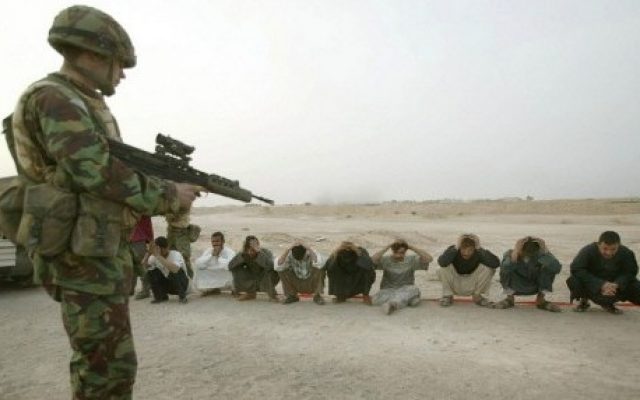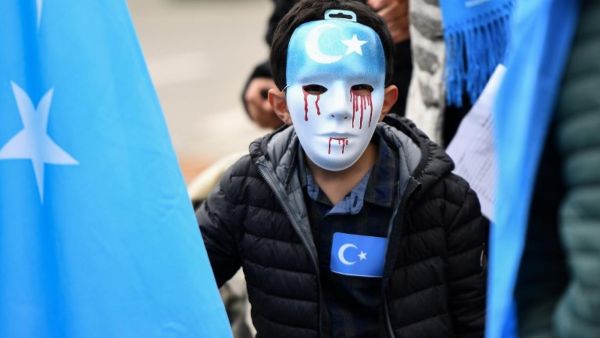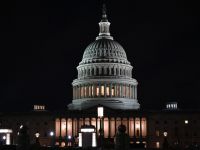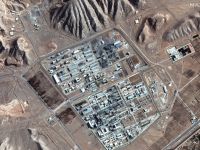Their every action, purchase, movement and conversation is closely monitored and logged into a central database. They cannot leave the country, they must pass through countless police barricades equipped with state-of-the-art facial recognition technology, their homes are visited by state agents, secret police and even neighbors are likely to collaborate with the state. Around two million of them are currently locked away in detention and ‘re-education centers’ indefinitely.
China insists it is simply enforcing a strict but effective ‘counter-terrorism’ strategy in Xinjiang, but it has been universally condemned by international human rights groups, who regularly point out the systemic rights violations embedded into the strategy and experienced every day by the region’s inhabitants.
It is then strange to see two security consultants advocate in an article for Foreign Affairs that the U.S. should actually collaborate with China in Xinjiang to aid its so-called ‘counter-terrorism’ mission rather than offer simply condemn it. “There is a better way for U.S. policymakers to engage the Chinese government regarding the persecution of Uyghurs and other minorities, and the approach is a counterintuitive one,” they write. “Washington should offer to share its counterterrorism expertise.”
It is then strange to see two security consultants advocate in an article for Foreign Affairs that the U.S. should actually collaborate with China in Xinjiang
The bombastic claim, couched in Orwellian terms that mirror Chinese state propaganda, is backed by a naive understanding of how Chinese state officials would use the advice given to them, and offers no details on what exactly Washington's repertoire of ‘counterterrorism’ strategies are. If the strategies include drone strikes, extralegal detentions and assassinations, sanctions, Muslim bans, indefinite military occupations and a subsequent securitization of the metropole, then such advice would guarantee a dramatic expansion of the oppression in Xinjiang.
The article comes at a crucial time for the U.S., as the next presidential election may determine the U.S.’ official foreign policy stance with regards to Xinjiang.
The article comes at a crucial time for the U.S., as the next presidential election may determine the U.S.’ official foreign policy stance with regards to Xinjiang. It is likely to be read and circulated within security and intelligence circles, and ideally for the authors, it would influence well-connected officials and consultants to shape U.S. foreign policy.
Therein lies the fatal danger of such advocacy.
If the article was written in a small outlet and promptly forgotten, there would be little risk of its recommendation creeping into policy circles, but Foreign Affairs is read widely by policy makers; it has real influence, and its status as a publication written and read by experts risks putting the U.S. on the wrong side of history.
Replicating Chinese Communist Party (CCP) Propaganda
(Foreign Affairs)
The most obvious error the article makes is in its framing.
Although it delves into the harsh surveillance and detention practices China is levying on its ethnic and religious minorities in Xinjiang, it persists in calling the crackdown part of a broader ‘counterterrorism strategy’ led by Beijing. They also recommend “Washington should appeal to China by offering to help ensure its domestic security rather than simply condemning the CCP’s human rights abuses.”
This is the same language the CCP deploys to defend the righteousness and legality of its operation. In 2014, China’s president Xi Jinping launched the so-called ‘People’s War on Terror” in Xinjiang after Uyghur extremists set off a bomb in Xinjiang’s capital city of Urumqi. Jinping commanded China to “Build steel walls and iron fortresses. Set up nets above and snares below.”
“Cracking down severely on violent terrorist activities must be the focus of our current struggle,” he added.
If we replace the term ‘counterterrorism’ in the article with ‘cultural genocide,’ the central claim that the U.S. should offer to service it becomes indefensible.
This ‘security first’ narrative is always deployed to justify targeting large sections of a population, but human rights activists and journalists have documented a far more wide-reaching crackdown than the one depicted in Foreign Affairs. But a critical parsing of the CCP’s words and actions would reveal that this is not primarily a counter-terror operation.
People are not merely deemed potential terrorists in Xinjiang, their places of worship are being bull-dozed, their cemeteries paved over, their bazaars emptied, their businesses replaced with tourist-friendly attractions.
People are not merely deemed potential terrorists in Xinjiang, their places of worship are being bull-dozed, their cemeteries paved over, their bazaars emptied, their businesses replaced with tourist-friendly attractions. Muslims are reportedly being forced to eat pork, are barred from offering halal food options, and cannot fast during Ramadan or grow beards. Qurans found warrant detention; praying is seen as an act of dissidence against the state. Uyghur Muslim customs are being systemically targeted and the practice of Islam has become virtually outlawed.
Uyghur Muslim customs are being systemically targeted and the practice of Islam has become virtually outlawed.
The CCP has officially declared Islam to be a ‘contagious “ideological illness,” where its only cure is its utter eradication.

A closed-off mosque in Xinjiang (Courtesy of Dr. Joanne Smith Finley)
“The goal is to mass engineer the identity of the Muslims--which are too different from Hans [the main ethnicity in China], from the state's perspective-- so they become loyal, obedient subjects of the CCP,” Maya Wang of Human Rights Watch told Al Bawaba.
“This is done through pervasive surveillance, political indoctrination and control--particularly over their movement--over the Muslims of that region.” New government documents leak corroborate this, as they instruct police to preemptively round up residents and rid them of their religious beliefs and practices in so-called re-education camps.
What’s happening in Xinjiang isn’t cut-and-dry counterterrorism; it’s the erasure of a people. It is cultural genocide.
If we replace the term ‘counterterrorism’ in the article with ‘cultural genocide,’ the central claim that the U.S. should offer to service it becomes indefensible.
It also reveals a foundational naivety regarding the CCP. The authors assume that Beijing is simply lacking in the good ideas the U.S. has, and that it is willing to listen and faithfully apply what American intelligence officials could offer.
The authors assume that Beijing is simply lacking in the good ideas the U.S. has, and that it is willing to listen and faithfully apply what American intelligence officials could offer.
But this is far from the truth: the CCP is much more likely to exploit the advice provided, using whatever it finds useful in locking Xinjiang down and promptly discarding the rest, especially if they include recommendations catering to human rights concerns that could dilute their overall strategy.
Gentle advice would not alter the CCP’s basic strategic priorities, which center on eliminating any semblance of a Uyghur threat by obliterating Uyghur identity altogether. In fact, advice that includes respecting Uyghur’s rights, like their freedom to associate or practice their religion, run counter to that central goal.
Even so, offering ‘counterterrorism’ advice to Beijing would pace the U.S. as a collaborator in the cultural genocide, and no matter the humane intentions the U.S. may have, such an approach risks it becoming a target of precisely the same extremists China is seeking to eradicate.
It also lends Beijing’s crackdown critical international legitimacy and support, which could shield it from human rights investigations and truth commissions.
What Exactly Would Washington’s Counterrerorism Advice Be?

A U.S. soldier stands guard over Iraqi detainees in 2003 (AFP/FILE)
The article argues that the U.S. has a more humane counterterrorism strategy than China or its ally, Russia, and that sharing it could help alleviate the human rights abuses currently underway.
“As the repercussions of China’s high-handed counterterrorism policy play out, U.S. policymakers may find themselves wishing that they had made the security-focused humanitarian argument—and Chinese officials will wish that they had listened to it,” the authors warn.
So what counterterrorism expertise should the U.S. offer? Details are strangely absent: there are no specifically humane-but-effective counterterrorism strategies put forward in the article.
So what counterterrorism expertise should the U.S. offer? Details are strangely absent: there are no specifically humane-but-effective counterterrorism strategies put forward in the article.
It recommends the U.S. offer counterterrorism assistance but leaves it up to the imagination of the reader as to what that assistance would entail. The authors only say that the U.S. “has a wealth of experience in countering the threat stemming from transnational terrorist organizations,” and hints that it wouldn’t be a scorched earth policy that involves “egregious human rights abuses.”
There have been a vast range of counterterrorism measures developed by the U.S., and many of them involve egregious human rights abuses, and in some cases, scorched earth strategies.
In the wake of 9/11, the Bush administration operated extralegal CIA black sites throughout the world where suspects were kidnapped and tortured but never charged. They opened up Guantanamo Bay to store suspected terrorists who continue to live in a legal black hole. They systematically lied to the public to foment mass support for the invasion and military occupation of Iraq, which killed hundreds of thousands of civilians and displaced over a million more.
Critically relevant to the Foreign Affairs article, they did this by weaponizing the language of terrorism and counterterrorism to take out the Saddam Hussein’s regime, which is exactly what China is doing now in Xinjiang to justify their own actions. The Iraq war created a political vacuum in the country that was partially filled by militias and ISIS.
Bush also authorized mass expansions of state power including the use of warrantless wiretapping. Obama then created a counterterrorism doctrine around the use of drones, maintaining dozens of conflicts around the world with minimal oversight. He even ordered killing American citizens suspected to be terrorists in the process.

Mural depicting U.S. soldiers' treatment of detainees in Abu Ghraib prison in Iraq (AFP/FILE)
These policies enabled Trump to kill thousands of civilians, level the Old City of Mosul in Iraq, and expand the shadow drone wars. Most notably, Trump has justified blanket travel bans from Muslim-majority countries, framing it as a part of his counterterrorism strategy. All three post 9/11 presidents’ doctrines involve outsourcing military roles to regional client states like Saudi Arabia, and the U.A.E. and non-state actors. As a result, U.S.-made weapons and equipment has flooded the Middle East’s black markets and supplied extremist groups like ISIS and al Qaeda.
Ironically, the authors warn “without U.S. cooperation however, Beijing will continue to turn to private security contractors—such as former Blackwater chief executive Erik Prince
Ironically, the authors warn “without U.S. cooperation however, Beijing will continue to turn to private security contractors—such as former Blackwater chief executive Erik Prince, known for employing a team of soldiers for hire who operate outside of recognized legal boundaries and with little accountability.”
They neglect to mention that Erik Prince got his start by integrating himself and his mercenary forces into the US’ counterterror security apparatus. They also do not acknowledge the U.S. military’s ongoing reliance on private companies like Google to train drone AI. In other words, privatizing parts of the Xinjiang crackdown would likely continue under U.S. guidance.
These are constitutive elements of the U.S.’ ‘wealth of experience’ in counterterrorism. If the advice U.S. officials give Beijing includes the use of drone strikes, blanket travel bans, expanding a surveillance state, and militarily occupying Xinjiang, it is likely to dramatically worsen rather than alleviate the human rights catastrophe unfolding in the region.
There are a vast number of ways the U.S. can act to protect Uyghur live, and ensure their safety: collaborating in Beijing is not one of them.
The authors of the article may retort by claiming that this is not the kind of advice they would recommend U.S. officials give. But without making clear which advice they would recommend, assuming there is a ‘humane’ counterterrorism policy the U.S. has used successfully, the authors allow policymakers to provide whatever they think good counterterrorism strategies could be. And because we are dealing with a U.S. administration led by Trump, it is likely strategies recommended would be the ones the U.S. currently deploys to disastrous effect.
Instead of engaging the Xinjiang issue through the lens of security, the U.S. should view it primarily from the lens of human rights.
Instead of engaging the Xinjiang issue through the lens of security, the U.S. should view it primarily from the lens of human rights.
Rather than legitimate and service China’s cultural genocide in Xinjiang, the U.S. should treat this as an opportunity to stand in solidarity with the targeted Muslim population, and vigorously defend their right to exist. Instead of consultations with hard-lined Xinjiang officials, the U.S. can offer asylum to fleeing Uyghurs and legal protection for them.
There are a vast number of ways the U.S. can act to protect Uyghur live, and ensure their safety: collaborating in Beijing is not one of them.
If the authors’ goal is to give China lessons from the American experience of securing a space in need of law and order, they should first reckon with the possibility that China is already doing this, and in fact could be taking inspiration from that history.
China’s crackdown in Xinjiang more resembles an AI-powered iteration of the Indian Wars than it does a counterterrorism operation.
The views expressed in this article do not necessarily represent those of Al Bawaba.







